Translating deep thinking into common sense
The Nine Most Memorable Screen Dialogues

By Vinay Kolhatkar
November 22, 2014
SUBSCRIBE TO SAVVY STREET (It's Free)
Quite a few sites pick memorable quotes from films and television. Many of these are one-liners. Some films, like Network (1976) had great monologues. But the essence of scriptwriting is in the strong visuals of a character-driven plot with no asides and voiceovers—which makes character-revealing dialogue all the more memorable.
Here are my nine most memorable ones. Yours may be different. Indeed, none of us have seen every TV show and film there ever has been made, even if we are restricting ourselves to the English language. So we must pick from our viewing history. I looked for eloquence, wit, and subtext, but above all—a character reveal—a gradual unfolding as the scene progresses.
The Godfather (1972), Screenwriter and novelist: Mario Puzo
This is the first scene in a long movie (and in Chapter 1 of the book). And we know straightaway that we are dealing with a man who is no ordinary thug.
Don Corleone: We have known each other many years, but this is the first time you’ve come to me for counsel or for help. I can’t remember the last time you invited me to your house for a cup of coffee, even though my wife is godmother to your only child. But let’s be frank here. You never wanted my friendship. And you feared to be in my debt.
Bonasera: I didn’t want to get into trouble.
Don Corleone: I understand. You found paradise in America. You had a good trade, you made a good living. The police protected you and there were courts of law. So you didn’t need a friend like me. Now you come and say “Don Corleone, give me justice.” But you don’t ask with respect. You don’t offer friendship. You don’t even think to call me “Godfather.” You come into my house on the day my daughter is to be married and you ask me to do murder – for money.
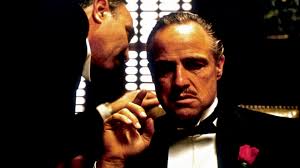 Bonasera: I ask you for justice.
Bonasera: I ask you for justice.
Don Corleone: That is not justice. Your daughter is alive.
Bonasera: Let them suffer then as she suffers.
[the Don is silent]Bonasera: How much shall I pay you?
[the Don turns away dismissively, but Bonasera stays on]Don Corleone: Bonasera, Bonasera, what have I ever done to make you treat me so disrespectfully? If you’d come to me in friendship, this scum who ruined your daughter would be suffering this very day. And if by some chance an honest man like yourself made enemies they would become my enemies. And then, they would fear you.
Bonasera: Be my friend… Godfather.
[the Don at first shrugs, but upon hearing the title he lifts his hand, and a humbled Bonasera kisses the ring on it]Don Corleone: Good.
[He places his hand around Bonasera in a paternal gesture]Don Corleone: Some day, and that day may never come, I will call upon you to do a service for me. But until that day, consider this justice a gift on my daughter’s wedding day.
[a gratified Bonasera offers his thanks and leaves]Don Corleone: [to Hagen] Give this job to Clemenza. I want reliable people, people who aren’t going to be carried away. I mean, we’re not murderers, in spite of what this undertaker thinks…
On the Waterfront (1954), Screenwriter Budd Schulberg
Terry Malloy is a dockworker whose brother Charlie, is corrupt and in with the Mafia. The context is that some years earlier, Terry had been a promising boxer, until Charlie persuaded him to take a dive.
Charlie: Look, kid, I – how much you weigh, son? When you weighed one hundred and sixty-eight pounds you were beautiful. You coulda been another Billy Conn, and that skunk we got you for a manager, he brought you along too fast.
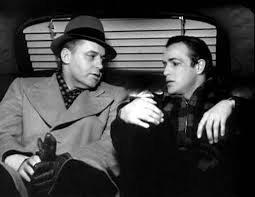 Terry: It wasn’t him, Charley, it was you. Remember that night in the Garden you came down to my dressing room and you said, “Kid, this ain’t your night. We’re going for the price on Wilson.” You remember that? “This ain’t your night”! My night! I coulda taken Wilson apart! So what happens? He gets the title shot outdoors on the ballpark and what do I get? A one-way ticket to Palooka-ville! You was my brother, Charley, you shoulda looked out for me a little bit. You shoulda taken care of me just a little bit so I wouldn’t have to take them dives for the short-end money.
Terry: It wasn’t him, Charley, it was you. Remember that night in the Garden you came down to my dressing room and you said, “Kid, this ain’t your night. We’re going for the price on Wilson.” You remember that? “This ain’t your night”! My night! I coulda taken Wilson apart! So what happens? He gets the title shot outdoors on the ballpark and what do I get? A one-way ticket to Palooka-ville! You was my brother, Charley, you shoulda looked out for me a little bit. You shoulda taken care of me just a little bit so I wouldn’t have to take them dives for the short-end money.
Charlie: Oh I had some bets down for you. You saw some money.
Terry: You don’t understand. I coulda had class. I coulda been a contender. I coulda been somebody, instead of a bum, which is what I am, let’s face it. It was you, Charley.
A Few Good Men (1992), Screenwriter: Aaron Sorkin
Two men are arrested for a murder of a disobedient Marine, and the naval investigators suspect they carried out a Code Red—an extrajudicial punishment.
Judge Randolph: Consider yourself in Contempt!
Kaffee: Colonel Jessep, did you order the Code Red?
Judge Randolph: You don’t have to answer that question!
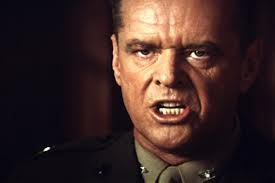 Col. Jessep: I’ll answer the question!
Col. Jessep: I’ll answer the question!
Col. Jessep: You want answers?
Kaffee: I think I’m entitled to.
Col. Jessep: You want answers?
Kaffee: I want the truth!
Col. Jessep: You can’t handle the truth!
[pauses]Col. Jessep: Son, we live in a world that has walls, and those walls have to be guarded by men with guns. Who’s gonna do it? You? You, Lt. Weinburg? I have a greater responsibility than you could possibly fathom. You weep for Santiago, and you curse the Marines. You have that luxury. You have the luxury of not knowing what I know. That Santiago’s death, while tragic, probably saved lives. And my existence, while grotesque and incomprehensible to you, saves lives. You don’t want the truth because deep down in places you don’t talk about at parties, you want me on that wall, you need me on that wall. We use words like honor, code, loyalty. We use these words as the backbone of a life spent defending something. You use them as a punchline. I have neither the time nor the inclination to explain myself to a man who rises and sleeps under the blanket of the very freedom that I provide, and then questions the manner in which I provide it. I would rather you just said thank you, and went on your way, Otherwise, I suggest you pick up a weapon, and stand a post. Either way, I don’t give a damn what you think you are entitled to.
Kaffee: Did you order the Code Red?
Col. Jessep: I did the job I…
Kaffee: Did you order the Code Red?
Col. Jessep: You’re Goddamn right I did!
The Matrix (1999), Screenwriters: Andy and Lana Wachowski
Neo is trapped in a dystopian future in which reality as perceived by most humans is actually a simulated reality, created by machines to subdue the human population, and is just beginning to realize this. Morpheus is one of the few who are free of this simulated reality. The parallels with today’s mainstream media entrenched with Government are ominous.
Morpheus: I imagine that right now, you’re feeling a bit like Alice. Hmm? Tumbling down the rabbit hole?
Neo: You could say that.
Morpheus: I see it in your eyes. You have the look of a man who accepts what he sees because he is expecting to wake up. Ironically, that’s not far from the truth. Do you believe in fate, Neo?
 Neo: No.
Neo: No.
Morpheus: Why not?
Neo: Because I don’t like the idea that I’m not in control of my life.
Morpheus: I know *exactly* what you mean. Let me tell you why you’re here. You’re here because you know something. What you know you can’t explain, but you feel it. You’ve felt it your entire life, that there’s something wrong with the world. You don’t know what it is, but it’s there, like a splinter in your mind, driving you mad. It is this feeling that has brought you to me. Do you know what I’m talking about?
Neo: The Matrix.
Morpheus: Do you want to know what it is?
Neo: Yes.
Morpheus: The Matrix is everywhere. It is all around us. Even now, in this very room. You can see it when you look out your window or when you turn on your television. You can feel it when you go to work… when you go to church… when you pay your taxes. It is the world that has been pulled over your eyes to blind you from the truth.
Neo: What truth?
Morpheus: That you are a slave, Neo. Like everyone else you were born into bondage. Into a prison that you cannot taste or see or touch. A prison for your mind.
Network (1976), Screenwriter: Paddy Chayefsky
Howard Beale is the anchor of the evening news, frustrated and overawed by the increasing commercialization of television. Fired from the network, he is revived to be played as a ranting and raving maniac by an ambitious female executive, desperate for ratings. Beale’s power surges; we think he is playing them. Beale then uses his fame to suspend a merger which can save the network from bankruptcy. The network’s Chairman, Arthur Jensen, calls him in.
 Arthur Jensen: You have meddled with the primal forces of nature, Mr. Beale, and I won’t have it! Is that clear? You think you’ve merely stopped a business deal. That is not the case! The Arabs have taken billions of dollars out of this country, and now they must put it back! It is ebb and flow, tidal gravity! It is ecological balance! You are an old man who thinks in terms of nations and peoples. There are no nations. There are no peoples. There are no Russians. There are no Arabs. There are no third worlds. There is no West. There is only one holistic system of systems, one vast and immane, interwoven, interacting, multivariate, multinational dominion of dollars. Petro-dollars, electro-dollars, multi-dollars, reichmarks, rins, rubles, pounds, and shekels. It is the international system of currency which determines the totality of life on this planet. That is the natural order of things today. That is the atomic and subatomic and galactic structure of things today! And YOU have meddled with the primal forces of nature, and YOU… WILL… ATONE! Am I getting through to you, Mr. Beale? You get up on your little twenty-one inch screen and howl about America and democracy. There is no America. There is no democracy. There is only IBM, and ITT, and AT&T, and DuPont, Dow, Union Carbide, and Exxon. Those are the nations of the world today. What do you think the Russians talk about in their councils of state, Karl Marx? They get out their linear programming charts, statistical decision theories, minimax solutions, and compute the price-cost probabilities of their transactions and investments, just like we do. We no longer live in a world of nations and ideologies, Mr. Beale. The world is a college of corporations, inexorably determined by the immutable bylaws of business. The world is a business, Mr. Beale. It has been since man crawled out of the slime. And our children will live, Mr. Beale, to see that… perfect world… in which there’s no war or famine, oppression or brutality. One vast and ecumenical holding company, for whom all men will work to serve a common profit, in which all men will hold a share of stock. All necessities provided, all anxieties tranquilized, all boredom amused. And I have chosen you, Mr. Beale, to preach this evangel.
Arthur Jensen: You have meddled with the primal forces of nature, Mr. Beale, and I won’t have it! Is that clear? You think you’ve merely stopped a business deal. That is not the case! The Arabs have taken billions of dollars out of this country, and now they must put it back! It is ebb and flow, tidal gravity! It is ecological balance! You are an old man who thinks in terms of nations and peoples. There are no nations. There are no peoples. There are no Russians. There are no Arabs. There are no third worlds. There is no West. There is only one holistic system of systems, one vast and immane, interwoven, interacting, multivariate, multinational dominion of dollars. Petro-dollars, electro-dollars, multi-dollars, reichmarks, rins, rubles, pounds, and shekels. It is the international system of currency which determines the totality of life on this planet. That is the natural order of things today. That is the atomic and subatomic and galactic structure of things today! And YOU have meddled with the primal forces of nature, and YOU… WILL… ATONE! Am I getting through to you, Mr. Beale? You get up on your little twenty-one inch screen and howl about America and democracy. There is no America. There is no democracy. There is only IBM, and ITT, and AT&T, and DuPont, Dow, Union Carbide, and Exxon. Those are the nations of the world today. What do you think the Russians talk about in their councils of state, Karl Marx? They get out their linear programming charts, statistical decision theories, minimax solutions, and compute the price-cost probabilities of their transactions and investments, just like we do. We no longer live in a world of nations and ideologies, Mr. Beale. The world is a college of corporations, inexorably determined by the immutable bylaws of business. The world is a business, Mr. Beale. It has been since man crawled out of the slime. And our children will live, Mr. Beale, to see that… perfect world… in which there’s no war or famine, oppression or brutality. One vast and ecumenical holding company, for whom all men will work to serve a common profit, in which all men will hold a share of stock. All necessities provided, all anxieties tranquilized, all boredom amused. And I have chosen you, Mr. Beale, to preach this evangel.
Howard Beale: Why me?
Arthur Jensen: Because you’re on television, dummy. Sixty million people watch you every night of the week, Monday through Friday (a lamp glows at the back of Jensen’s head).
Howard Beale: I have seen the face of God.
Arthur Jensen: You just might be right, Mr. Beale.
Boston Legal (TV show, 2008), Screenwriter David E Kelley
Season 4, Episode 15— Tabloid Nation
An ambush interview, reality-TV style, causes an unanticipated murder. Attorney Alan Shore invokes the 1976 movie Network in his closing.
Alan Shore: …Now the networks look for our guilty pleasures and morbid curiosities and pander to those with the hope that they’ll get us addicted. Once you get people hooked, you’ve got ’em! And you have to get people hooked because everything today is ratings, demographics, market share, money. Even the news divisions are now profit centers, which means that if good-looking, white-toothed anchors have better TVQs than credentialed journalists, you get the eye-candy! And if positive coverage of the war in Iraq reaches more households, you get Fox News. In fact today you can switch back and forth between the right-wing news and the left-wing news. Whatever happened to Huntley? Brinkley? John Chancellor? To news that was just the news? Now we have partisan junk appealing to the lowest common denominator which brings us currently to…
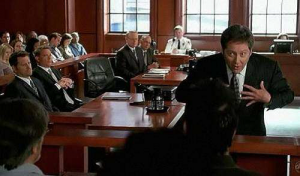 Attorney Melvin Palmer: Your Honor?
Attorney Melvin Palmer: Your Honor?
Alan Shore: … the program at issue, Dr Ray! Mr. Palmer said his client couldn’t possibly have seen this coming. Well, that simply isn’t true. This tragedy was inevitable. It’s practically scripted! It’s happened before. Talk show ambushes have gone awry leading to murder or suicide. This isn’t a first. But here’s what’s truly horrifying. A tragedy occurred here, a woman was killed, but for the show–for the show–the real tragedy was that the killing didn’t happen on the show!
Attorney Melvin Palmer: Look, Your Honor! I object.
The Judge points his finger to shush him.
Alan Shore: That would have been the ratings blockbuster. That would have been the big score everybody was hoping for. But they had to settle for the next best thing which was that the murder became news. The nightly news was perfectly happy to do the job for them. They gave Dr Ray all the promotion it could possibly want airing sensational clips and graphics from the show again and again and again. You see how it all works so beautifully together! The girl was killed! The show benefits! The news benefits! And we eat it up! Psychologically damaged people are paraded on stage to be exploited, ridiculed, taunted. Of course, this is what we get! And we stand to get a lot more of it because it sells. And it costs almost nothing to produce. And what’s not to love? Here we have an emotionally unstable ex-boyfriend with a history of violence, armed with a marriage proposal certain to be rejected in front of the world. And the fact that an innocent young woman ended up butchered was good business for all. Just business. Well, so is a lawsuit. The most memorable part of the movie Network was when Howard Beale started shouting on national television, “I’m mad as hell, and I’m not gonna take it anymore!” And the country joined in with him. You need to join in now. You need to go back to that room and say you’re not going to sit quietly and let these networks assault decency for profit. You’re not going to stand for the exploitation of the disenfranchised. You’re sick of the networks debasing a medium they’re supposed to be guardians of. Don’t take it anymore. Please. Please. Get mad as hell! And don’t take it… anymore.
Alan sits down. Jerry nods approvingly.
The Social Network (2010), Author: Ben Mezrich, Adaptation: Aaron Sorkin
Mark Zuckerberg, founder of Facebook, resents that undeserving people are trying to pile on to his success, and are suing him for a large amount.
Gage: Mr. Zuckerberg, do I have your full attention?
 Mark Zuckerberg: [stares out the window] No.
Mark Zuckerberg: [stares out the window] No.
Gage: Do you think I deserve it?
Mark Zuckerberg: [looks at Gage] What?
Gage: Do you think I deserve your full attention?
Mark Zuckerberg: I had to swear an oath before we began this deposition, and I don’t want to perjure myself, so I have a legal obligation to say no.
Gage: Okay – no. You don’t think I deserve your attention.
Mark Zuckerberg: I think if your clients want to sit on my shoulders and call themselves tall, they have the right to give it a try – but there’s no requirement that I enjoy sitting here listening to people lie. You have part of my attention – you have the minimum amount. The rest of my attention is back at the offices of Facebook, where my colleagues and I are doing things that no one in this room, including and especially your clients, are intellectually or creatively capable of doing.
[pauses]Mark Zuckerberg: Did I adequately answer your condescending question?
The Fountainhead (1949), Screenwriter and novelist: Ayn Rand
Howard Roark is an idealistic uncompromising architect. Ellsworth Toohey, an architecture critic for a major newspaper, despises Roark’s individualism.
Ellsworth Toohey: There’s the building that should have been yours. There are buildings going up all over the city which are great chances refused and given to incompetent fools. You’re walking the streets while they’re doing the work that you love but cannot obtain. This city is closed to you. It is I who have done it! Don’t you want to know my motive?
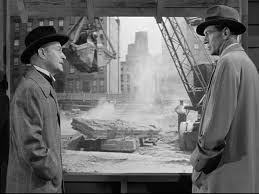 Howard Roark: No!
Howard Roark: No!
Ellsworth Toohey: I’m fighting you and shall fight you in every way I can.
Howard Roark: You’re free to do what you please!
Ellsworth Toohey: Mr. Roark, we’re alone here. Why don’t you tell me what you think of me in any words you wish.
Howard Roark: But I don’t think of you!
[Roark walks away and Toohey’s head slumps down]
The Dark Knight (2008), Screenwriters: Jonathan and Christopher Nolan, Story: Bob Goyer, Original Creators of Batman and The Joker: Bob Kane and Bill Finger
Incorruptible DA, Harvey Dent, is the exemplar of virtue for Gotham City, torn apart by vicious crime gangs. The Joker forces the city to choose between Dent and his fiancée, both captive in buildings about to explode in opposite ends of the city. Batman, despite being in love with the same woman, chooses Dent. But Dent cracks when he realizes what he has lost.
 The Joker: Oh, you. You just couldn’t let me go, could you? This is what happens when an unstoppable force meets an immovable object. You truly are incorruptible, aren’t you? You won’t kill me out of some misplaced sense of self-righteousness. And I won’t kill you because you’re just too much fun. I think you and I are destined to do this forever.
The Joker: Oh, you. You just couldn’t let me go, could you? This is what happens when an unstoppable force meets an immovable object. You truly are incorruptible, aren’t you? You won’t kill me out of some misplaced sense of self-righteousness. And I won’t kill you because you’re just too much fun. I think you and I are destined to do this forever.
Batman: You’ll be in a padded cell forever.
The Joker: Maybe we can share one. You know, they’ll be doubling up, the rate this city’s inhabitants are losing their minds.
Batman: This city just showed you that it’s full of people ready to believe in good.
The Joker: Until their spirit breaks completely. Until they get a good look at the real Harvey Dent, and all the heroic things he’s done. You didn’t think I’d risk losing the battle for Gotham’s soul in a fistfight with you? No. You need an ace in the hole. Mine’s Harvey.
Batman: What did you do?
The Joker: I took Gotham’s white knight and I brought him down to our level. It wasn’t hard. You see, madness, as you know, is like gravity. All it takes is a little push!
[the Joker laughs hysterically as Batman races off and the cops come to take the Joker into custody]








Thank you for the feedback, Kurt Keefner.
As stated above, the pick was made on this basis–” I looked for eloquence, wit, and subtext, but above all—a character reveal—a gradual unfolding as the scene progresses,” so not surprised that you found them “really about character.”